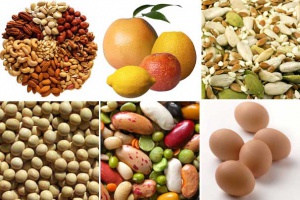Vitamin B8
Contents
Description
Vitamin B8 is a water soluble fatty lipid found in many foods, was once seen as part of the B vitamin group, yet since it has been discovered to be produced by the human body from glucose, there is not sufficient evidence that shows vitamin B8 as a vital nutrient. Some argue it is vital to the formation of healthy cells and the triggering of calcium release in the body while others claim it is not necessary to humans as a vitamin given that it is produced within the body as well as gained from outside supplement and food sources. Although debated as to whether inositol is actually essential to the body, it has been shown to provide various benefits in supplementation or through intake of foods that contain or release this substance when consumed.
Health Benefits
There are various benefits to be gained by normal intake of vitamin B8 including a healthy immune system, nervous system and healthy glowing skin. It plays a role in the metabolism of carbohydrates, proteins and fats and may prevent grey hair and hair loss. Inositol is also used for metabolic functions, pH balance in the body, cell growth, fatty acid and enzyme production, the use of B vitamins in the body and the formation of nucleic acids and glycogen. Inositol has been used effectively to treat anxiety, OCD, and chronic depression among other psychological disorders. Some studies show successful utilization of inositol in Alzheimer's Disease patients, panic disorders and as an analgesic for pain mediation.
Beauty Benefits
Shown in some case to be helpful to maintaining the pH balance in the body, vitamin B8 is thought to be beneficial to the prevention of skin, hair and nails as it will prevent any disorders such as eczema, acne, hair loss or graying of the hair. There is also evidence to support inositol as beneficial to healthy glowing skin. Aside from beauty benefits, this compound has been shown to successfully prevent and treat psychological disorders so you will feel better and happier with the use of this compound.
Food Sources
- Nuts
- Beans
- Seeds
- Eggs
- Soybeans
- Legumes
- Citrus Fruits
Daily Dose Recommendations
Since toxicity seems to only occur in people with already occurring disorders, most do not experience an overdose of this compound and therefore have little risk in using it as a supplement but, as always, it is better to consume this compound through food sources to decrease the likelihood of side effects or toxicity occurring. Average: 40 Mg Therapeutic Range: 100 Mg-3,000 Mg+
Deficiency
Deficiency symptoms of vitamin B8 include appetite loss, fatigue, dry skin, nausea, heart abnormalities, chronic depression, vomiting, and impaired growth or neurological impairments in fetuses and infants.
Over Dose/Toxicity
Toxicity or over dose of vitamin B8 seems to only present itself when individuals already suffer from a disorder or chronic renal failure and affect these patients alone. Although toxicity seems only apparent in these cases, high levels of this compound can decrease the absorption rate of zinc, calcium and iron.
